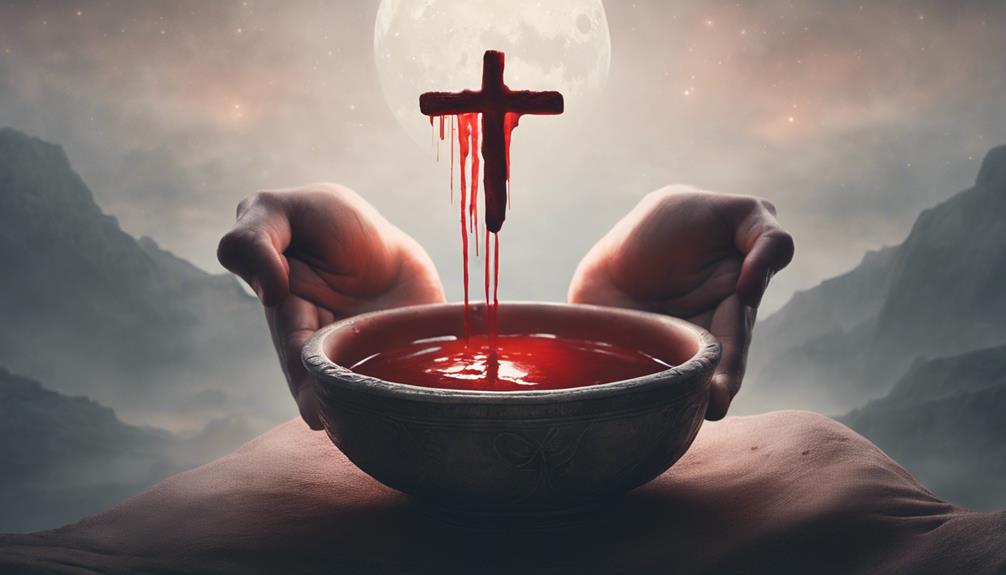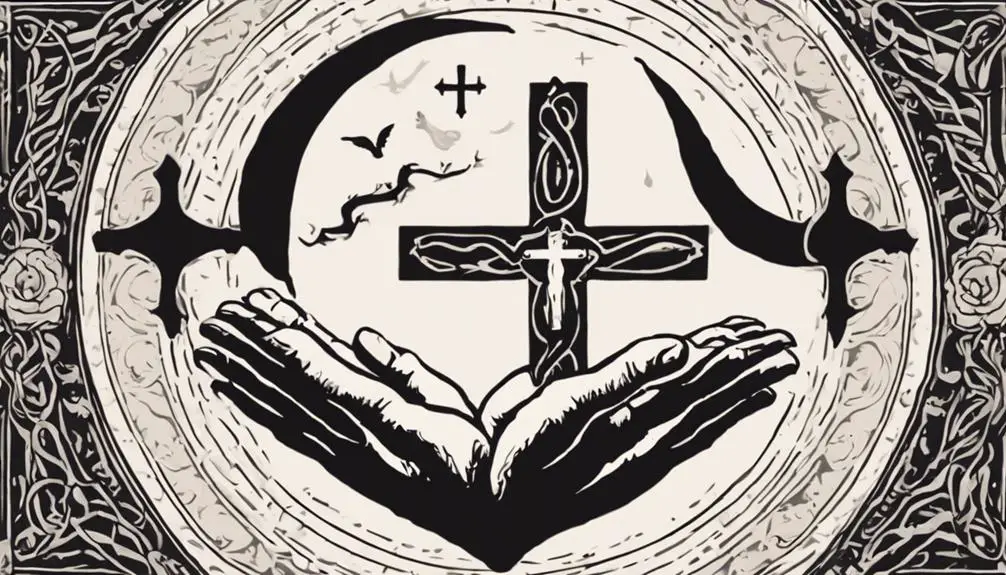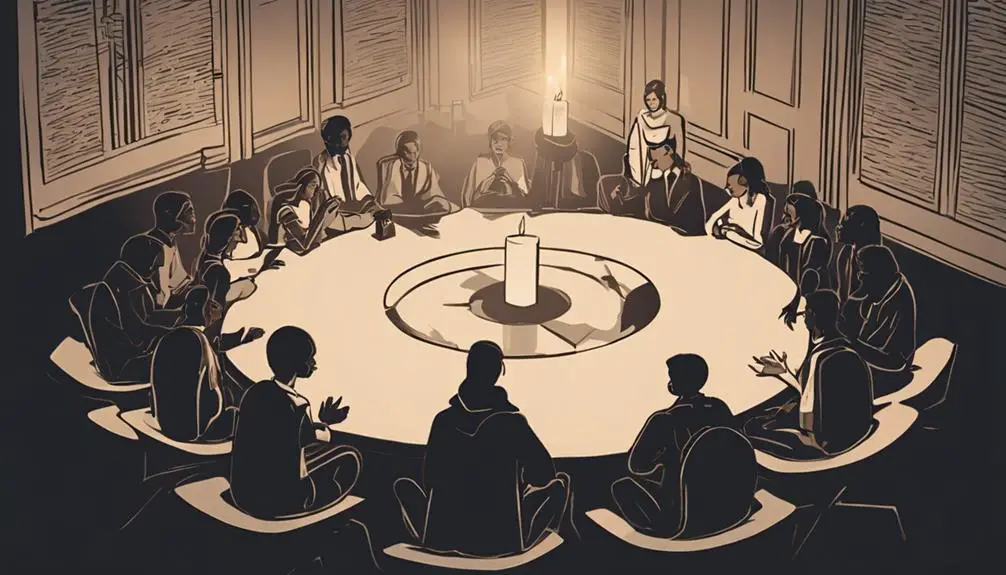Omnipresent in history, the morality of blood covenants stirs debate, urging a deeper exploration of their ethical and spiritual implications.

Is Blood Covenant a Sin?
You might not be aware, but blood covenants hold a complex place in history, intertwining with both sacred rituals and dark practices. They're not just the stuff of old tales or horror movies; they carry significant historical, religious, and ethical implications that resonate to this day.
While you might quickly dismiss them as archaic or sinister, the question of whether engaging in a blood covenant is considered a sin is not black and white. As we explore the multifaceted perspectives on blood covenants, from their ancient origins to modern interpretations, you'll find there's much more to uncover about the moral quandaries they present.
Key Takeaways
- Religious perspectives vary, with Christianity cautious and Islam discouraging physical acts, emphasizing spiritual bonds.
- Blood covenants have deep cultural roots but raise ethical questions about consent and harm.
- Symbolically, they represent commitment and loyalty but may conflict with modern legal and ethical standards.
- The sinfulness of blood covenants depends on cultural context, religious beliefs, and the intention behind the act.
Understanding Blood Covenants

To fully grasp the concept of blood covenants, it's crucial to delve into their historical and cultural origins. You'll find these practices deeply rooted in various societies, each with unique interpretations and applications. The cultural origins of blood covenants reveal a rich tapestry of beliefs and values. These covenants aren't merely agreements; they're sacred pacts, infused with spiritual significance, transcending mere verbal or written contracts.
Exploring the ritual purposes of blood covenants, you uncover their role in forging unbreakable bonds. These rituals often symbolize a profound commitment, serving as the ultimate testament to trust and loyalty between parties. In many cultures, the act of mixing blood is seen as merging the lives and destinies of those involved, making the covenant a revered tradition.
Moreover, these practices serve as a means of social cohesion, reinforcing ties within communities or between clans. The ritual purposes extend beyond the personal, affecting the social fabric and ensuring order and harmony. Through this lens, blood covenants aren't simplistic or barbaric; they're complex, deeply meaningful practices that reflect the values and beliefs of a community.
Historical Significance
Understanding the cultural origins and ritual purposes of blood covenants illuminates their profound significance within communities, now let's explore their historical importance and how they've shaped societal structures and relationships over centuries. These agreements, often steeped in cultural rituals, have been pivotal in the development of trust and alliances, playing a crucial role in the establishment of social hierarchies and the maintenance of peace among groups.
Historically, blood covenants transcended mere agreements; they were sacred bonds that underscored the societal impacts of trust and loyalty. In many cultures, these covenants were the highest form of commitment, embedding themselves into the fabric of societal norms and expectations. They served not only as personal bonds but also as mechanisms for political alliances, marriage agreements, and peace treaties.
Through these covenants, societies were able to forge strong communal ties, ensuring mutual support and cooperation. The rituals surrounding these covenants reinforced communal values, emphasizing the importance of commitment, honor, and sacrifice. As such, blood covenants have been instrumental in shaping the dynamics of human interactions, influencing both the structure of societies and the relationships within them.
Religious Perspectives

Religious traditions across the globe offer a range of perspectives on the practice of blood covenants, each interpreting its morality and spiritual significance in diverse ways. You'll find that these traditions often reflect the broader cultural practices and legal implications associated with such solemn agreements.
- Christianity: Views blood covenants with caution, emphasizing the spiritual covenant through Christ's sacrifice rather than human-initiated blood covenants.
- Judaism: Historical texts reference blood covenants as significant, binding agreements, yet contemporary practice typically avoids physical acts in favor of symbolic rituals.
- Islam: Generally discourages the practice, highlighting the importance of spiritual bonds over physical ones and considering the health and legal implications.
- Indigenous religions: Often see blood covenants as integral to their cultural practices, embedding such rituals within their spiritual and community life.
- Hinduism: Lacks a uniform stance but typically focuses on the spiritual and karmic implications of actions, suggesting a cautious approach to any form of covenant that could bind one spiritually or morally.
Analyzing these perspectives, you're encouraged to note how deeply intertwined religious views are with cultural practices and legal implications. Each tradition offers a unique lens through which the practice of blood covenants is evaluated, reflecting broader societal values and norms.
Ethical Considerations
Exploring the ethical dimensions of blood covenants requires a careful examination of the moral principles at stake. You must consider both the cultural impacts and legal implications of these agreements. From an ethical standpoint, the practice raises questions about consent, coercion, and potential harm to those involved. In cultures where blood covenants are deeply rooted, they're often seen as a binding moral commitment that transcends legal contracts. Yet, you've got to wonder about the pressures individuals may face to enter such covenants, possibly against their better judgment.
The legal implications of blood covenants can't be overlooked either. In jurisdictions where these practices aren't legally recognized, participants might find themselves in a gray area, lacking formal recourse if the covenant is breached. This brings up concerns about the enforceability of such agreements and the possible legal consequences for those involved.
As you delve deeper into the ethical considerations, it's paramount to balance respect for cultural traditions with the protection of individual rights. Ethical analysis must navigate these complex waters, ensuring that cultural practices don't infringe upon the well-being and autonomy of individuals.
Modern Interpretations

In recent years, scholars have reevaluated blood covenants, considering their relevance and interpretation within contemporary societal norms and values. As you delve into modern interpretations, it's essential to recognize the impact of cultural shifts and personal beliefs on these ancient practices.
The transformation in how society views blood covenants is influenced by several factors:
- Cultural shifts: Societies evolve, and with this evolution comes a change in perception. What was once considered sacred may now be viewed with skepticism or even outright rejection.
- Personal beliefs: Individual spirituality and belief systems play a significant role in how blood covenants are perceived today. Many find them incompatible with contemporary ethical standards.
- Legal considerations: Modern legal frameworks often don't recognize the binding nature of blood covenants, affecting their practice and enforcement.
- Medical knowledge: Increased awareness of the health risks associated with blood sharing has led to a decline in the practice.
- Globalization: Exposure to diverse cultures and beliefs has encouraged a more critical examination of practices like blood covenants, often leading to their questioning or abandonment.
Analyzing these factors reveals a complex interplay between tradition and modernity, significantly influencing the current standing and interpretation of blood covenants within society.
Frequently Asked Questions
How Do Blood Covenants Impact Interpersonal Relationships Outside of a Religious Context?
Blood covenants can significantly alter interpersonal relationships by reshaping trust dynamics and potentially leading to social exclusion. You'll find these covenants impact how individuals connect, trust, and are perceived by their broader social circles.
Can a Blood Covenant Be Legally Binding in Any Contemporary Legal Systems?
You're exploring if a blood covenant holds legal weight. Generally, contract enforceability requires clear terms and consent, without duress. Legal precedents rarely recognize such agreements, focusing instead on these established criteria for binding contracts.
Are There Any Psychological Effects or Trauma Associated With Participating in a Blood Covenant?
Yes, participating in a blood covenant can lead to psychological effects or trauma, impacting your emotional resilience. Dream interpretation might reveal underlying fears, signaling a need to address the emotional aftermath of such experiences.
How Do Different Cultures Around the World Today Perceive and Practice Blood Covenants Outside of a Historical or Religious Framework?
You'll find that cultural significance and modern adaptations of blood covenants vary globally. Societies today reinterpret these practices, often detaching them from their original contexts, to fit contemporary values and communal beliefs.
What Are the Medical Risks Associated With Performing a Blood Covenant, Considering Modern Understanding of Bloodborne Pathogens?
You're facing serious medical risks with blood covenants due to bloodborne pathogens. Infection control and safe practices are crucial. Without these, you're at high risk for diseases like HIV and hepatitis. Always prioritize health.
Conclusion
In evaluating blood covenants, you've navigated through their historical roots, religious stances, and ethical debates, arriving at nuanced modern interpretations.
Historically significant, these covenants carry profound spiritual implications across cultures, yet religious perspectives vary, with some viewing them as sacred and others as sinful.
Ethically, they pose complex dilemmas, balancing tradition against contemporary moral standards.
Ultimately, your understanding hinges on analyzing these layers, recognizing that the sinfulness or sanctity of blood covenants isn't universally agreed upon but deeply contextual and subjective.



Sign up